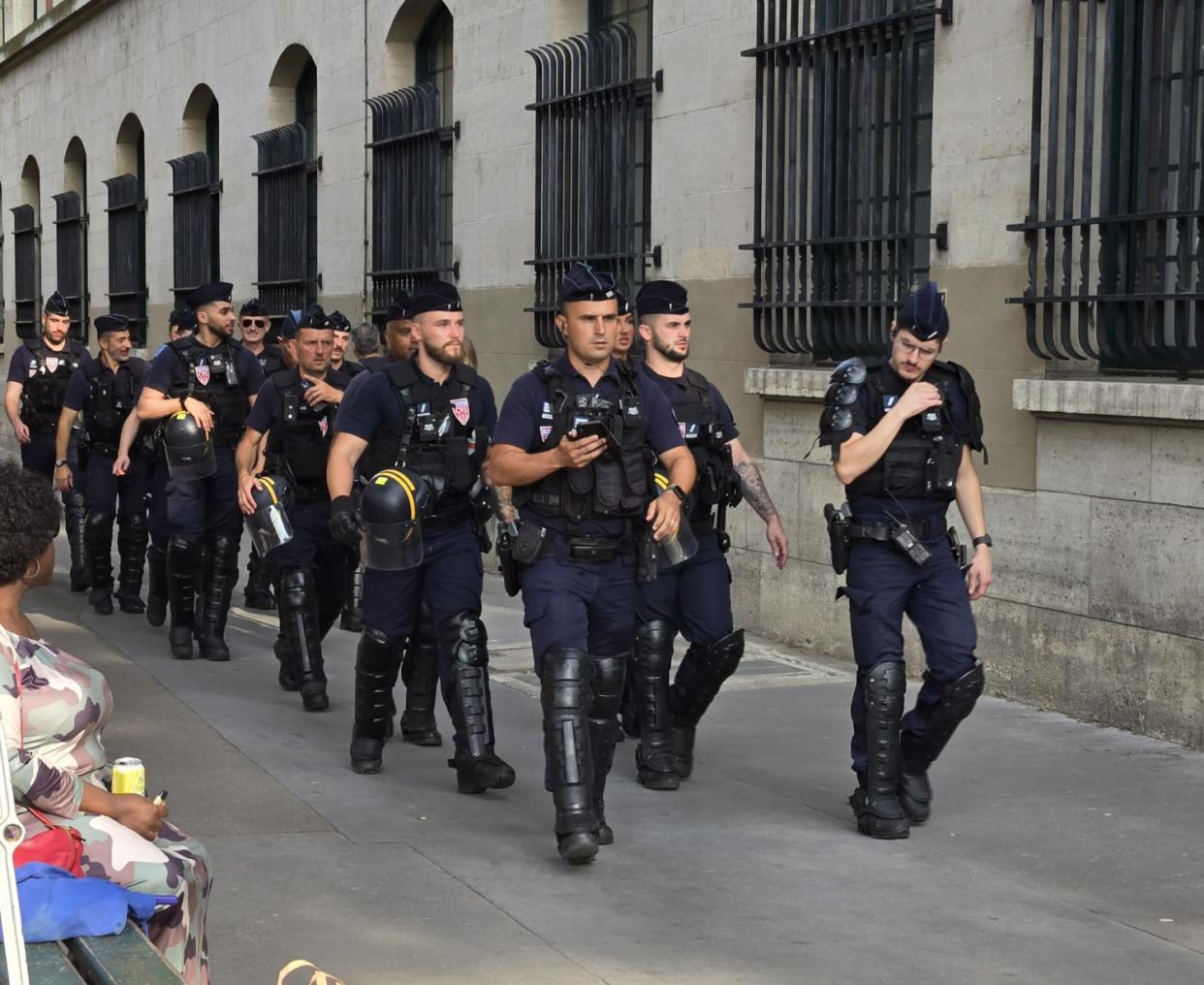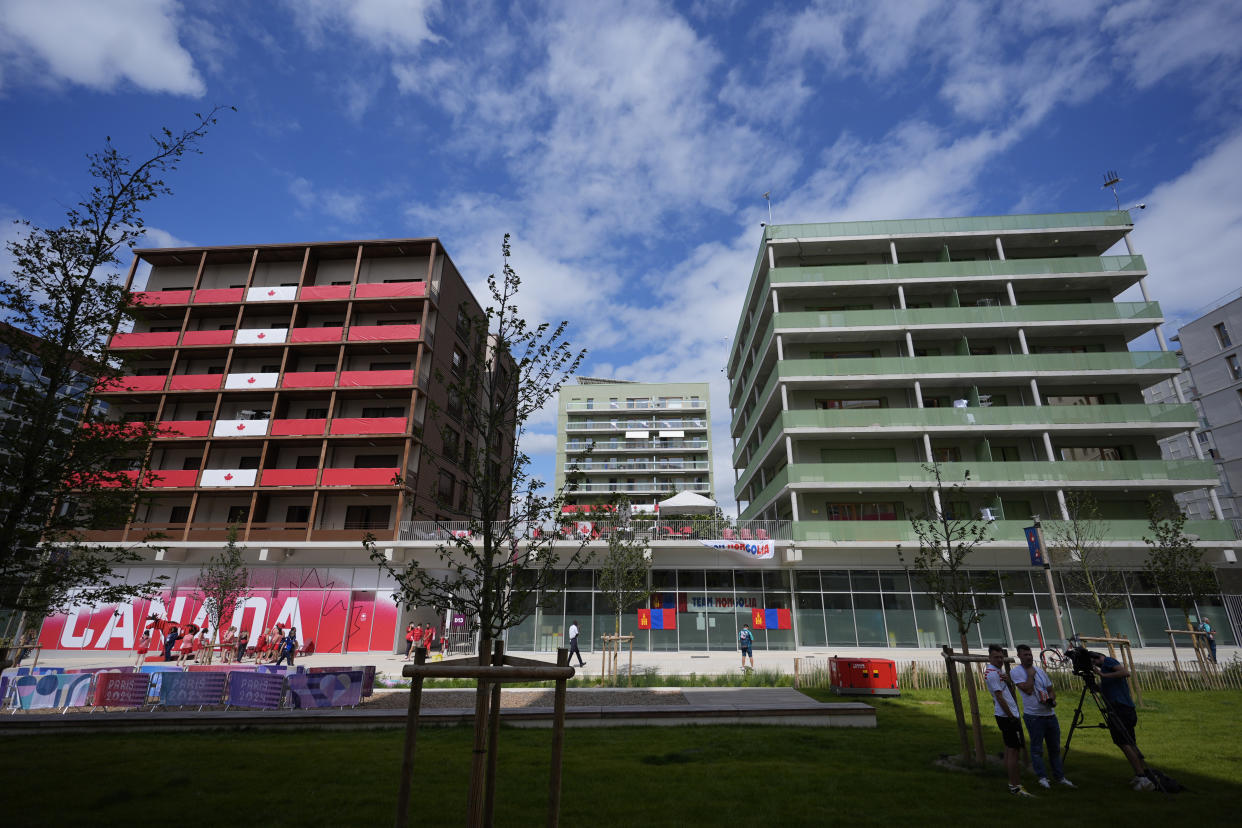2024 Paris Olympics: Massive police presence outside Israel's first soccer match

PARIS — Ninety minutes before kickoff of Israel’s first Olympic men’s soccer match in 48 years, the mood outside the Parc Des Princes was anything but festive.
Uniformed French police officers easily outnumbered the spectators draped in Star of David flags or clad in blue and white scarves.
Police stood guard at every path leading to the stadium grounds, barricading roadways, turning away pedestrians without tickets and patting down those who had them. Outside the stadium, throngs of police kept watch or patrolled by foot. Most carried guns and wore bulletproof vests. Some were on horseback or clad in riot gear.
The Israeli team bus arrived escorted by an armada of motorcycle police and police vans. As kickoff approached, the sound of police helicopters could be heard overhead.
⚽️ #JO2024 – La sélection israélienne de football 🇮🇱 fait son arrivée au Parc des Princes 🇫🇷 sous un très haut niveau de sécurité. https://t.co/ccjmgSR0WUpic.twitter.com/Cj5yTsI6iC
— ERETZ Sport (@EretzSport) July 24, 2024
The massive police presence showed that French Minister of the Interior Gérald Darmanin wasn’t bluffing Tuesday when he vowed to create an “antiterrorism perimeter” around Israel’s opening match against Mali. Darmanin promised during a French TV interview to have 1,000 police standing guard in preparation for potential clashes between Israeli fans and pro-Palestinian activists or in case of an attack.
Kickoff arrived without any major disturbances, save for loud boos and whistles from the crowd at the start of the Israeli national anthem. Israeli fans responded by drowning out the hecklers with singing and applause.
Midway through the first half, a handful of anti-Israeli protesters in the stadium's second deck waved Palestinian flags and displayed pro-Palestinian messages on their shirts. They later led a "Mali" chant after a flurry of offense from the West African side.
That there were no worse incidents was a victory for France's Olympic security. A geopolitically charged evening eventually gave way to a soccer match, which ended with Israel and Mali drawing 1-1.
The police-heavy scene was the latest sign that this could be an unusually tense Olympics. Paris 2024 begins with Russia still at war with Ukraine and Israel involved in a bloody conflict in Gaza.
On the morning of October 7, Hamas launched an unprecedented surprise attack in response to what it calls Israeli crimes against the Palestinian people. Waves of gunmen affiliated with the Palestinian militant group stormed across the Gaza border into Israel, killing 1,200 people and taking several hundred more hostage.
Hamas “committed numerous war crimes and crimes against humanity against civilians,” according to a Human Rights Watch report released earlier this month. “The Hamas-led assault on October 7 was designed to kill civilians and take as many people as possible hostage,” said Ida Sawyer, crisis and conflict director at Human Rights Watch.
Hoping to end Hamas control of Gaza and prevent its leaders from rising out of the rubble of war, Israel retaliated with a fierce aerial bombardment followed by a ground invasion. More than 37,000 are dead, according to the Gazan Health Ministry. “People in Gaza have told us that the dead are the lucky ones,” Human Rights Watch said in a statement last month, “because the wounded suffer so acutely due to the Israeli authorities’ blockade of lifesaving aid.”
Israeli athletes have become a target of international outrage over the war despite having little to do with the actual conflict. A pro-Palistinian protester wearing a “RED CARD FOR ISRAEL” T-shirt chained himself to a goalpost in May shortly before a women’s soccer match between Scotland and Israel was to kick off. Pro-Palestinian activists also protested the inclusion of the Israeli national team at a softball tournament in Canada earlier this month.
Israel was the target of political violence at the 1972 Games when a Palestinian militant group infiltrated the Olympic village and killed 11 members of the Israeli Olympic team. Ever since, IOC president Thomas Bach said Tuesday, “They always have taken their own additional security measures.”
“They also did this time and they feel comfortable with this situation,” Bach added.

Security at the Olympics “is a top priority,” Mihi Zohar, Israel’s Minister of Culture and Sports, wrote in an Instagram post earlier this summer. Zohar said his organization increased its security budget by 50% ahead of Paris 2024 in an effort “to make the Israel flag fly proudly and confidently at the Olympic Games.”
Inside the Olympic Village, where the athletes stay, many buildings are covered with the colors and emblems of their respective countries. Canada's dorm, for example, is outfitted in red and white banners with a giant "CANADA" sign on the ground floor. Next door, Israel's dorm is noticeably devoid of any signage.
It's easy to understand Israel's caution given the buildup to these Olympics. A left-wing French politician sparked outrage earlier this month when he said Israeli athletes were "not welcome" in Paris. Then the Palestine Olympic committee wrote a letter to Bach demanding that the IOC ban Israel from the upcoming Olympics.
Darmanin said Tuesday that Israel’s 88 Olympic athletes will be protected 24 hours a day “from the beginning to the end of their presence on national soil.” He called Wednesday’s soccer match against Mali an important test of France’s security system.


